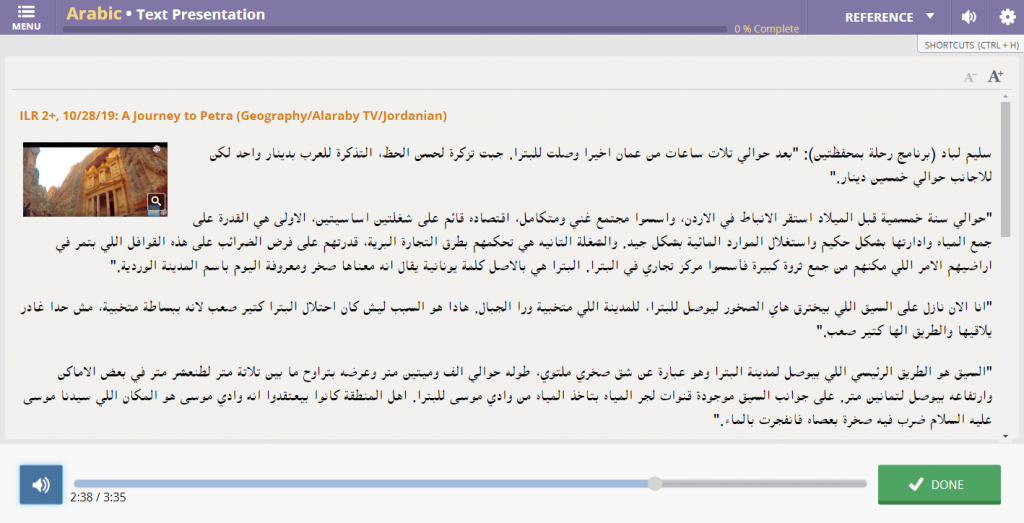CL-150 Cohort Lesson of the Month – October 2019 Posted by meaghan on Nov 7, 2019 in Cohort Lesson of the Month, For Learners, For Program Managers
As of October 2019, there are more than 7,940 Cohort lessons published in the CL-150—and counting. We’re taking a look at one lesson each month to find out why language professionals are maintaining proficiency on the job with weekly Cohort lessons.
What are CL-150 Cohorts?
If you’re not familiar, CL-150 Cohorts are weekly lesson streams designed specifically for USG language professionals maintaining proficiency on the job. Each lesson provides a 2-hour “workout” at a specific ILR level, based on a professionally relevant, authentic source.
You can learn more about CL-150 Cohorts and complete a sample lesson here.
Cohort Lesson of the Month
This month’s featured lesson, A Journey to Petra, comes from the Levantine Arabic ILR 2+ Cohort.
While all Cohort lessons are based on authentic sources, many of those sources are written, with the accompanying audio recorded by the lesson author. That’s not the case with dialects like Levantine Arabic—all dialect lessons are created specifically from authentic audio sources, particularly videos. The Cohort author then transcribes the lesson text from the audio.
It’s trickier than it might seem, finding level-appropriate authentic audio, without too much background noise, or too much MSA mixed in, which is common among many news outlets. But Tania, the Levantine Cohort author, manages to find the Goldilocks of Levantine sources each week, taking care to ensure the audio is just right.
Tania based this month’s featured lesson on an episode from a TV show called “A Trip with Two Wallets” (رحلة بمحفظتين), where the two show hosts visit two locations in a country and must stick to a specific budget:
“The audio was converted from the episode. I did a lot of trimming to get this audio from the host visiting Petra, one of the modern Seven Wonders of the World. The host is physically walking from the visitors’ center, through the Siq, to the Treasury “Al-Khazneh”, out to the Street of Facades, and then to the Nabatean Amphitheater. He provides a lot of historical facts about the whole area, which makes the lesson more interesting because it adds more to it than just the dialect focus.”
To supplement that interesting history, Tania added the Slide Show activity with slides about Petra, as well as an interactive map that allows learners to click on important sites in the region and learn more.
Beyond the historical context, the lesson focuses on comprehension of the text and audio, particularly through reading and listening comprehension questions, the latter of which Tania explains is critical for learners of dialect:
“When I am authoring the lessons, the activities that I spend most of the time on are the comprehension activities. I think the listening comprehension is really important because in reality, if the student is in one of the Levantine speaking countries, they would be hearing it and not reading it. So, they need to train their ears to pick it up.”
The lesson also carefully touches on grammar, highlighting verb use:
“In the Levantine dialect you’ll find patterns, not necessarily strict rules like you would find in MSA. But the Table activity in this lesson presents past tense and present tense verbs. Present tense verbs are unique in dialect because they differ from MSA in conjugation, whereas past tense is more similar. The table has a mix of both, so learners can practice recognizing the pattern.”
As you can see, Tania takes special care with the Levantine lessons, focusing on the regional expertise, comprehension skills, and grammar knowledge learners will need to recognize and use the dialect on the job.
Levantine Arabic sustainers, complete this month’s featured lesson and practice listening to real-world audio!
Sustaining another language? Explore our available Cohorts and stay tuned for next month’s featured lesson for more behind-the-scenes action from our Cohort team.



